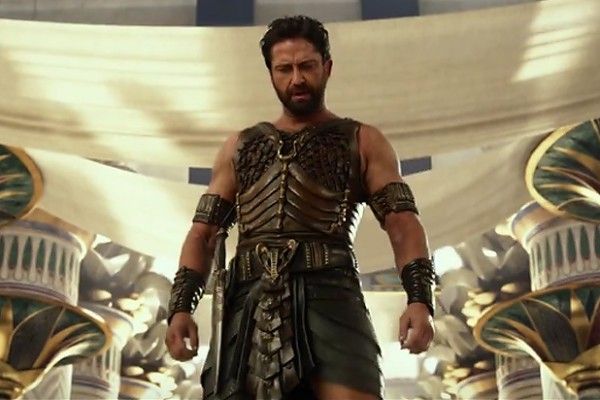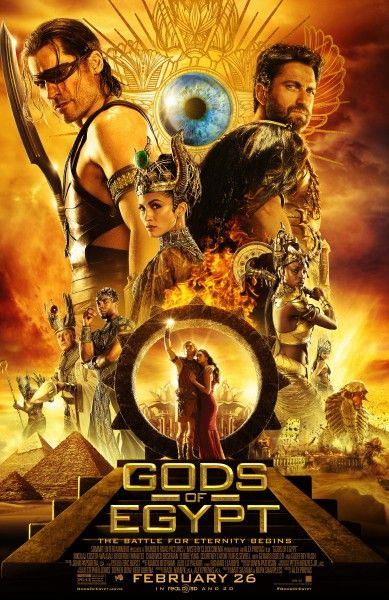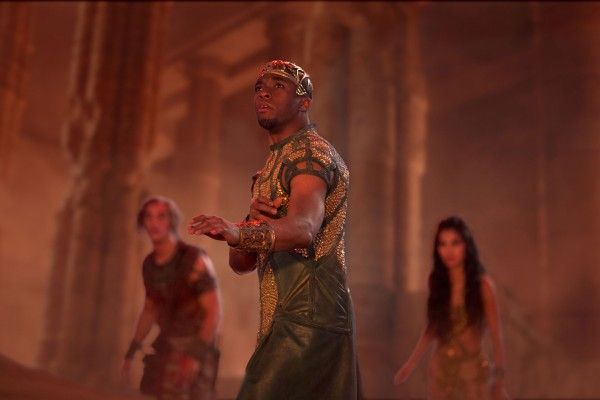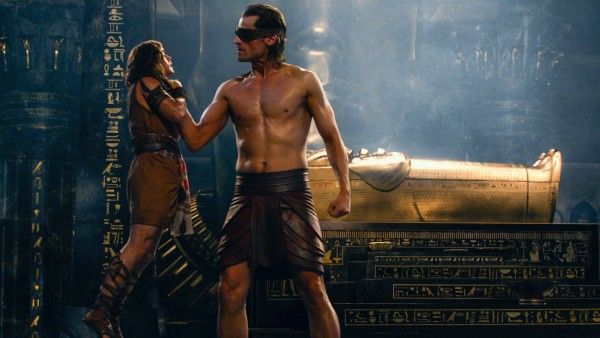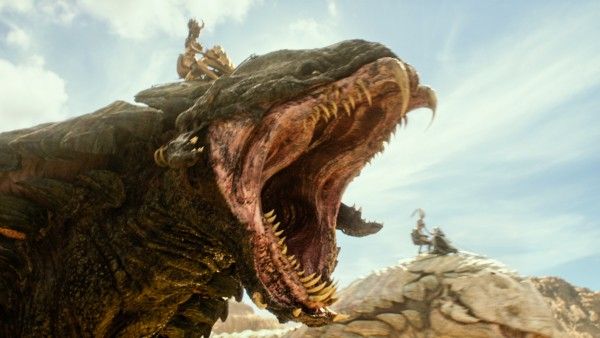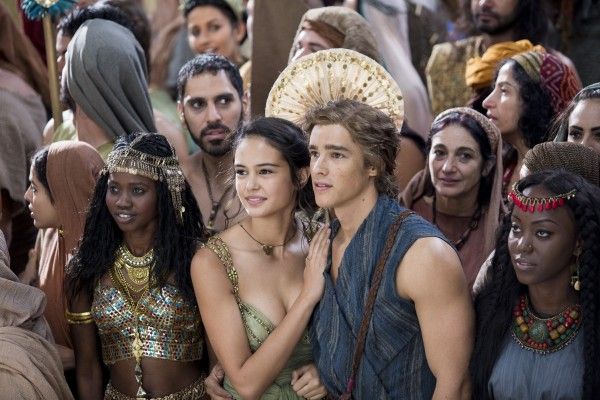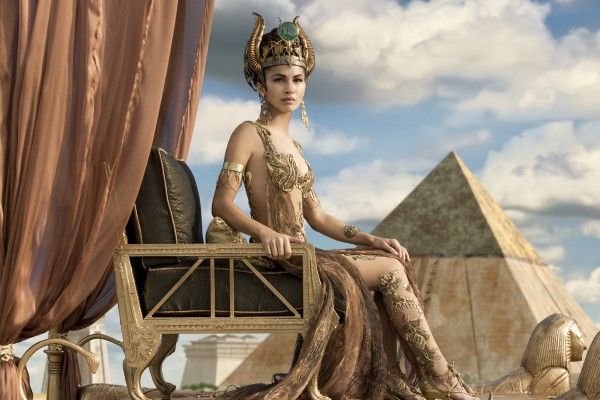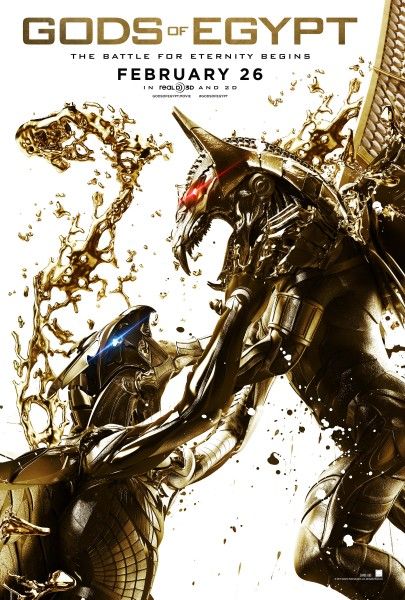With Gods of Egypt now in theaters, a few days ago I landed an exclusive interview with director Alex Proyas. As a fan of Proyas’ work (he’s previously directed The Crow, Dark City, Garage Days, I Robot and Knowing), I made sure to use my time to not only discuss his new film, but almost his entire resume. During the interview he talked about being an early proponent of digital cameras, how much of his work for the cancelled motion-capture epic Paradise Lost made it into Gods of Egypt, the casting process, what he learned from early screenings, how his first cut was close to three hours, and a lot more. In addition, Proyas talked about his thoughts on The Crow remake, memorable moments from filming Dark City, if he’s surprised no one has tried to remake the film, and what happened with his version of Dracula Year Zero.
If you’re not familiar with the film, Gods of Egypt stars Gerard Butler as Set, the cruel god who ushered in an age of darkness after usurping the throne. When the young mortal Bek (Brenton Thwaites) enlists the help of another powerful god, Horus (Nikolaj Coster-Waldau), they lead a rebellion to overthrow the merciless king. The film also stars Elodie Yung, Abbey Lee, Geoffrey Rush, Chadwick Boseman, and Courtney Eaton.
ALEX PROYAS: How are you doing?
Collider: I’m good. The last time I spoke to you was 2009 and you had just filmed Knowing with digital cameras, you were a little bit ahead of the curve.
PROYAS: Yes, indeed. Everyone’s doing it now. I’m not ahead of the curve any longer, everyone’s jumped on the same bandwagon there.
Yeah. It was funny because I was looking at the interview we did, I think you used the RED. And it was, back then it was 4K and you were talking about how it was only going to get better and so on and so forth.
PROYAS: Yeah. Well we’ve continued to using the RED cameras, we used the one called Epic on Gods of Egypt. Which is very impressive. We went through all the same comparison tests with all the different cameras and it still came up as the best of the lot, really. So, they continue to win my vote there.
If I’m not mistaken, this is real film nerd stuff but, I think you used the new Panavision lenses on the film. Is that true?
PROYAS: Yeah, incredibly detailed lenses. We had this technique in the movie where the Gods are kind of scaled up, they’re nine feet tall in relationship to the humans in the movie. A lot of the time we were achieving that with two cameras shooting side by side with different lenses and then compositing the two images together in post. But sometimes we would scale up the same image with the resolution of the Epic and also the Panavision lenses, we were able to often pull from the same image, which worked really well. The clarity of the lenses was really important in this particular project.
I put on Twitter that I was going to talk to you and a lot of people brought up Paradise Lost and wanting to know, because obviously that was a project you were going to do, and then you end up doing Gods of Egypt. Was there any sort of stuff you learned for Paradise Lost or any ideas that you were going to use on that that you brought into Gods of Egypt?
PROYAS: Yes, very much so. Just on a conceptual story level, the Horus and Set story is not dissimilar to that of the Judeo-Christian parable of Michael and Lucifer’s relationship. To me, I was immediately struck by that similarity and excited by the story of Gods of Egypt just purely on that level. But technically and visually, from a filmmaker’s point of view, yes there was a lot of stuff that we developed for Paradise Lost that we kind of carried through, retold to a certain extent, for Gods of Egypt. Paradise Lost was conceived of as an entirely motion capture project. Not entirely, but predominantly motion capture project. So there was a lot of development of the photoreal angels and demons in Paradise Lost that we were focusing on. Gods is much more live action based, but there was quite a lot of crossover between the two projects for sure.
I’m a fan of your work and it’s been kind of interesting and a bit frustrating, to watch over the years as you’ve gotten close to making projects and then have them slip away. Did you feel like that was ever going to happen with Gods or was there a moment where you thought, “Wait a minute, this is actually going to move forward.”
PROYAS: [laughs] Well, you never know these days. Anything is possible. Sadly, the climate of filmmaking that we are working in right now affects a lot of people, not just myself, a lot of filmmakers are very frustrated by Hollywood’s often indecision or their fear about moving forward on projects. When I was doing Paradise Lost, I was working on that movie for over a year. And every time I would come into my office at Fox Studios in Australia, I would often think to myself, “Well, I can’t believe they’re letting me make this movie,” because conceptually it was so out there for a large scale movie. And sure enough, that sadly became the reality which is that they didn’t let me make the movie. [laughs] They got to a certain point, we got to a point on the production where I felt like the budget overshot the concept. There was a sweeter spot that we just could not make the movie for, and everybody just got very cold feet, which is why the project was shut down. Gods is a much more commercial movie, it’s very much, the way I approached it was very much along the lines of Raiders of the Lost Ark or The Man Who Would Be King, classic movies from the past that I liked as a kid. I was very much trying to channel that type of classic old fashioned filmmaking unashamedly. The project, I think, was much more commercial for the studio and therefore their support continued through the process. But as I say, you never know. You never know with movies these days, it’s just the climate of filmmaking right now.
What did you learn from any friends and family screenings that possibly impacted the finished film?
PROYAS: Not a great deal, the film has played very well, people genuinely really like it. I can’t say that I changed very much based on the test screenings that we did. A movie like this, it’s very much a process of refinement because there are so many visual effects in the movie that you’re constantly chasing the ability to finish in the shot in time to screen to people, so the movie makes some sort of cohesive sense to people. So really, right up until the end, people were watching unfinished shots. Sometimes previews were cut with the live action just because we didn’t have shots that were complete enough to put into the cut, but the movie has consistently played really well, and I was really thrilled by that. For me, the audiences who see it love it, they see this big fun adventure. So hopefully we can convince people that’s what it is and get them in the door in this world where original fantasy films have such a hard time getting an audience these days.
Well that brings me to the casting process. Obviously, you need to get certain actors to sort of open the film and get the money together. Talk a little about the casting process and what was the one name that helped deliver international money, if you will?
PROYAS: I think we have a great cast. I think Gerard Butler and Nikolaj Coster-Waldau are both wonderful actors, Gerard brings a great deal of box office clout to the project, probably him more so than anyone else made the movie financially viable for the investors. But, I mean, Geoffrey [Rush] is also a fabulous actor of course and brought an immense depth to the cast. I think we have a really great bunch of people involved and as an ensemble I think they bring a great deal of interest to the movie, as well.
Talk a little bit about your first cut vs. the finished film. How long was your first cut?
PROYAS: The movie is truly epic in its scope in terms of story, and I think the first cut we put together was well over three hours. It worked really well, I thought. Most first cuts are considerably longer than what you end up with. In this case of course, along with all the other reasons to make a movie shorter, we had the fact of, as I said before, so much of it is visual effects, and visual effects cost dollars, sometimes dollars you don’t have in your budget. So we had to work very hard to getting it down to the slightly over two hour length that it’s ended up as. But, I hope that some of the scenes that had to go for those reasons we might be able to resurrect one day, if there’s a director’s cut we might have to bring those scenes back. There’s some quite good stuff that we had to leave on the cutting room floor so to speak.
Absolutely. When you say your first cut was three hours, is that like an assembly cut? Or was that a cut that you were like, “Oh I could show this.”
PROYAS: Oh, no. There’s no such thing as an assembly cut really for me, because as we’re making the movie, we’re cutting the scenes pretty tightly and refining scenes as we go. So over the actual production period, we’re refining the movie quite a lot, so by the time come out of the shoot, we have something that you would normally call assembly, but it’s a pretty good cut and a pretty good indication of the pace of the movie. So, assemblies we left in the dust a long time ago, we really jumped that part of the process. The three hour cut played pretty well. There was probably a cut around the 2:45 mark that I thought absolutely rocked, but as I said, it was just impractical to complete a movie of this type at that length.
Are you a fan, obviously I’m sure you had that version, or you did a pre-viz -- did you do a pre-viz of the whole movie?
PROYAS: We didn’t do the entire movie, we did all the big complex sequences. Maybe 70% of the movie was done as pre-viz. Unlike Paradise Lost which we entirely pre-viz'd.
I’m just curious because, for fans of your work that maybe want to see the 2 hour 45 minute version, maybe there’s a way to put a copy on the Blu-ray that has a theatrical cut mixed in with pre-viz, mixed in with stuff.
PROYAS: Yeah, I guess. The problem with doing that, of course, is unless you’re doing the scenes to the same level as you’d done with the rest of the movie, it can be kind of distracting to watch. Maybe for fans it would be okay, but I prefer to spend some time actually finishing the key scenes that were dropped to a greater level of refinement than seeing the entire soup to nuts version of the movie. As I say, there was one version, and we did many, many versions on our way to the final running time. There were quite a few versions that were may be practical to complete at a longer running time. I know there’s a handful of scenes I was really fond of that were dropped. But we’ll see, this is all kind of premature because until we know how the film will go commercially speaking, we won’t know what will take shape.
Have to ask while I have you on the phone, what are your thoughts on people trying to remake The Crow? Is it something that you’re watching or are you like, “I’m done with that.”
PROYAS: You know, I’ve moved on and I just feel like it’s… I personally feel like it’s kind of unnecessary. I’ve said this many times, I’ve completed the original movie to honor Brandon and that’s the sole reason I did it. I’m happy I did it for that reason. I sort of feel like it’s his legacy and I personally don’t have a lot of time for people trying to reignite that movie in other ways. So you know, to me, this is one situation where it would be nice if Hollywood kind of left it alone and let it remain Brandon Lee’s legacy.
You know, the way this is shaping up, it might be.
PROYAS: [laughs] Yeah, well, I know every few years you hear about it a remake and it never really comes to fruition.
I love Dark City, I could talk to you for a long time about Dark City. Are you at all surprised in this era of, people love that movie, in this era of remakes and reboots that no one has tried to remake it?
PROYAS: You know, not really. Over the years we’ve been, we’ve had discussions about TV shows or sequels, but none of the stuff has really moved forward. Nothing surprises me, if someone was to announce they were remaking it, it wouldn’t surprise me. Hollywood is like game for remaking anything these days. It could go either way and it wouldn’t surprise me either way.
I have one thing I want to ask you about Dark City which is, when you think back on the making of the film, is there a day or two that you always remember from filming?
PROYAS: [laughs] There are numerous moments. I think the one running moment that I remember very fondly through the making of Dark City is Richard O’Brien coming up with a musical version, being a wonderful composer, he would often come up with songs for the scenes that would make us laugh on the set. I think that’s one thing that sort of kept me going, every time Richard would step on set he would have some sort of cool new ditty for me. But, yeah, it was a fun shoot in many ways.
If you don’t mind me asking, you were attached for a little while to Dracula Year Zero. Did you ever see the version they released?
PROYAS: Um, I have to say I didn’t actually watch the entire movie. I watched bits of it on a plane or something I think, so I can’t really comment on the film. It’s very different to my version of that script. The reason I got involved with that is because I thought the script was fabulous, it was really a redesign of that iconic character, but I don’t know if they achieved that with the finished movie.
I wanted to ask you about your version of Dracula, what you were going to go with the material.
PROYAS: With the studio at the time, it was about budget. My idea was to take ownership of Dracula as a character. He is one of the most filmed characters in all of movie history. I felt like they to take the high road and make something really extraordinarily epic, in scope, but unfortunately, all the conversations we had all along the line were about cutting scenes, making battle scenes less dramatic, making a lower budget project and I think that’s what eventually made me walk away from it. I felt like you couldn’t do that to that particular script, I felt like you had to elevate the whole project.

